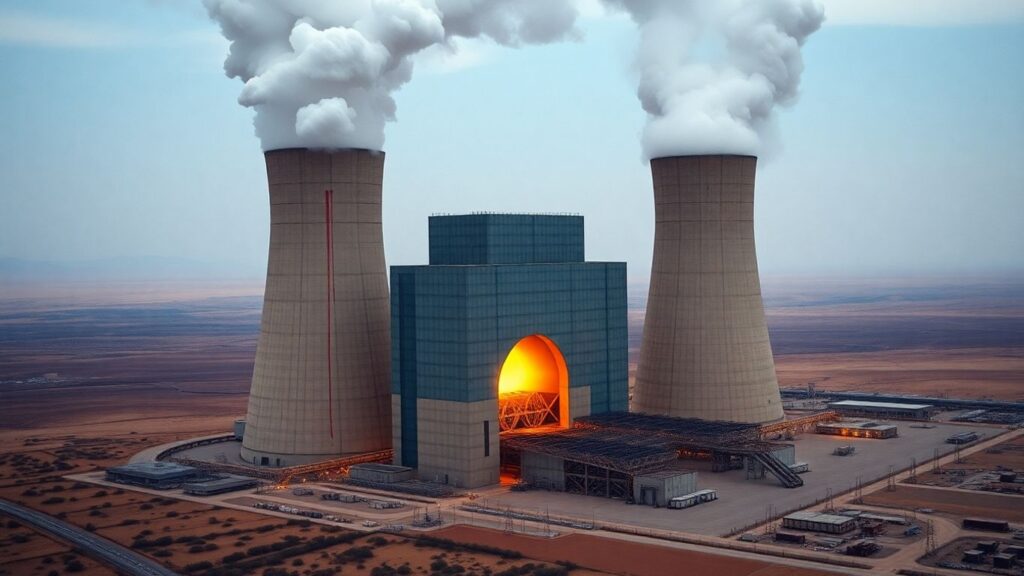The United Kingdom and the United States have solidified a groundbreaking partnership aimed at enhancing energy security through a significant expansion of nuclear power. This collaboration, marked by substantial private investment and streamlined regulatory processes, signals a new era for nuclear energy in both nations, promising job creation, economic growth, and a strengthened commitment to clean energy.
Key Takeaways
- A new UK-US deal accelerates the licensing process for nuclear power plants, potentially reducing approval times by half.
- Significant private investment is flowing into new nuclear projects across the UK, including advanced modular reactors (AMRs) and small modular reactors (SMRs).
- The UK is set to quadruple its nuclear power capacity by 2050, aiming for 24GW to meet a quarter of its electricity needs.
- The partnership includes a commitment to eliminate reliance on Russian nuclear materials by the end of 2028.
A New Era for Nuclear Power
The "Atlantic Partnership for Advanced Nuclear Energy" aims to expedite the construction of new nuclear power stations by streamlining regulatory approvals. This agreement is expected to cut down the licensing period for nuclear projects from several years to approximately two, significantly boosting the pace of development.
This initiative is a cornerstone of the UK’s "energy superpower" mission, focusing on developing clean, homegrown energy sources to ensure national energy security and reduce dependence on volatile global markets. The expansion of nuclear power is seen as crucial for meeting net-zero targets while providing reliable and affordable energy.
Investment and Job Creation
The partnership has already spurred substantial private investment. Several key deals have been announced, including:
- Plans by X-Energy and Centrica to build up to 12 advanced modular reactors in Hartlepool, potentially creating 2,500 jobs and generating enough power for 1.5 million homes.
- Holtec, EDF, and Tritax are planning advanced data centers powered by small modular reactors at the former Cottam coal-fired power station.
- Last Energy and DP World are establishing micro modular nuclear power plants to support port expansion.
These projects are projected to create thousands of high-skilled construction and operational jobs, injecting billions into the UK economy, particularly in industrial heartlands and coastal communities.
Streamlining Regulations and Driving Innovation
Recognizing past delays caused by red tape, the UK government is overhauling planning rules to facilitate nuclear development. This includes allowing nuclear power stations, including SMRs, to be built at a wider range of locations beyond the previously designated eight sites. The government is also establishing a Nuclear Regulatory Taskforce to improve efficiency and align with international standards.
The collaboration extends to fusion energy, with joint experimental programs leveraging AI to accelerate progress towards commercial fusion power. Furthermore, the UK is investing up to £300 million in producing High-Assay Low-Enriched Uranium (HALEU) fuel, a critical component for advanced reactors, thereby reducing global reliance on Russia for such materials.
Political Endorsement
Leaders from both nations have expressed strong support for the initiative. UK Prime Minister Keir Starmer highlighted the partnership’s role in powering the economy and communities, while U.S. Secretary of Energy Chris Wright emphasized the nuclear renaissance driven by commercial innovation and allied collaboration. The initiative is poised to strengthen energy security, foster technological leadership, and secure nuclear supply chains across the Atlantic.
Sources
- Golden age of nuclear delivers UK-US deal on energy security, GOV.UK.
- POLITICO Pro, POLITICO Pro.
- Biggest expansion of nuclear power for 70 years to create jobs, reduce bills and strengthen Britain’s energy
security, GOV.UK. - Clean energy future to be ‘built in Britain’, GOV.UK.
- Government rips up rules to fire-up nuclear power, GOV.UK.












